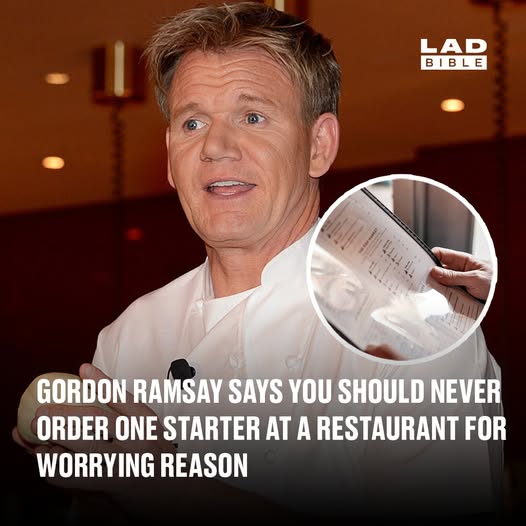In a interview with Town & Country Gordon Ramsay offered a strong warning: stay clear of ordering the “soup du jour” at restaurants
He explained:
“Ask what yesterday’s soup du jour was before today’s special. It may be the case that it’s the soup du month.”
His point is clear: soups of the day are often made from leftover ingredients, and the phrases “soup of the day” or especially “soup du month” may mask dishes that have been sitting around far too long.

Why the Soup of the Day Raises Red Flags
This advice isn’t just flashy chef-dish talk—it has a solid rationale. Restaurants use soup specials to avoid waste, combining previous-day ingredients into a “new” menu item. Ordering soup du jour means you’re essentially buying yesterday’s extras. As Ramsay quips, “what’s soup du month?” . In Ramsay’s view, chefs might bag the least appetizing leftovers into the soup pot. Thus, the convenience of a quick soup can also conceal the risk of a stale, uninspired starter.
Turning to Server Recommendations
Ramsay doesn’t suggest blind ordering—he highlights the value of staff insight. He recommends asking your server what they suggest if you’re unsure. According to him, servers often sample dishes and understand popular picks. He says these recommendations are “insight into what the chef has added and what the locals have”
In short: trust the individuals who interact with both the kitchen and diners—they often know which dishes shine.
Other Menu Traps to Watch For
Beyond soups, Ramsay calls attention to other suspicious signs on menus:
- “Specials” overload: A section labeled “specials” should be short and change frequently. He cautions, “When they list ten specials, that’s not special”
- Unsubstantiated superlatives: Phrases like “world’s best,” “famous,” or “the best in the country” often signal marketing fluff rather than actual quality
These are basic yet powerful indicators of a restaurant puffing up its offerings. Ramsay urges diners to look for authenticity elsewhere.
Bonus Tip: Wine Hacks for Bargain Lovers
While warning against menu traps, Ramsay also reveals a lesser-known wine tactic. Ask for the “bin end” list—these are wines with scratched labels or older vintages that didn’t sell fast. He often suggests picking a bottle that’s recommended for no more than around $30, giving you value without sacrificing flavor.
The Master himself: Why His Words Matter
Gordon Ramsay isn’t just another celebrity chef—it’s a name synonymous with culinary excellence. With 17 Michelin stars behind his restaurant empire and a global media presence across shows like Hell’s Kitchen, Kitchen Nightmares, and The F Word, his advice holds significant weight. When he says skip the soup of the day, it isn’t snobbery—it’s Wisdom backed by experience from kitchens that run at peak efficiency and strict ingredient control.
Final Takeaway for Dining Out
Ditch the soup du jour—you might be worse off than eating yesterday’s leftovers.
- Trust your server—they know what dishes actually work.
- Beware marketing chatter—limits on specials and hype words often point to something less genuine.
- For wine wisdom, explore the bin end list to find hidden gems without overspending.

Conclusion
Gordon Ramsay’s restaurant advice goes beyond celebrity flair—it’s grounded in years of culinary expertise and practical experience. His warning about the “soup of the day” is a reminder that not every menu item is as fresh or special as it sounds. By staying alert to red flags like overloaded specials and overhyped descriptions, diners can avoid being misled and make more satisfying choices. Trusting server recommendations and exploring less obvious options, like bin end wines, can enhance your dining experience without breaking the bank. Ultimately, eating out should be a pleasure—not a gamble—and a little insider knowledge can go a long way toward ensuring you enjoy the best a restaurant truly has to offer.

















